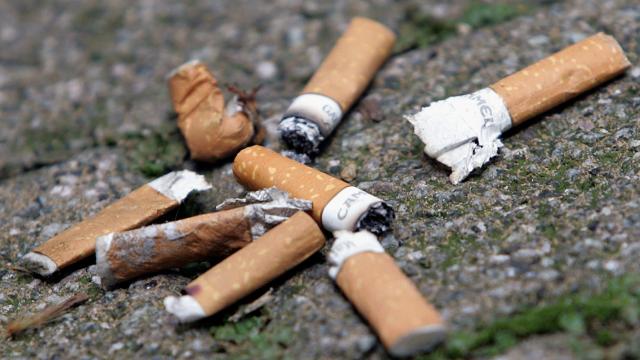Other humans aren’t the only living things affected by your smoking habit, scientists in the UK warn. Their new research suggests that at least some plants can’t grow as well in the presence of discarded cigarette butts.
Cigarette butts — the plastic, usually brown filters left behind when a person finishes smoking — are a ubiquitous source of pollution. By some accounts, they’re the most common form of litter in the world. Yet there’s been relatively little research on the specific environmental effects these butts could have on wildlife, including plants.
So researchers at Anglia Ruskin University in the UK conducted a simple experiment. They left behind various kinds of butts — unsmoked, smoked, and smoked with some of the cigarette still remaining — in pots of freshly seeded Lolium perenne (perennial ryegrass) and Trifolium repens (white clover). Then they watched the plants grow and compared them to control plants with pieces of wood roughly the same size and shape as the butts left behind.
The chances of an individual root successfully growing from a seed (germination) were lower on average in the pots with butts in them, regardless of the kind of butt used. Shoots were also stunted in both plants. And for the clover, the overall mass of roots was smaller than it was in control plants.
The study’s findings were published this month in Ecotoxicology and Environmental Safety.
“Despite being a common sight littering streets and parks worldwide, our study is the first to show the impact of cigarette butts on plants. We found they had a detrimental effect on the germination success and shoot length of both grass and clover and reduced the root weight of clover by over half,” said lead author Dannielle Green, a biologist at Anglia Ruskin, in a release from the university.
The likely cause of the stunted growth in these plants is the plastic found in the filters, the authors said. That’s because plants that were exposed to filters with some of the tobacco cigarette still remaining were about as stunted as plants with the filters alone. These filters, usually made out of cellulose acetate, can take years, if not decades, to fully degrade in the environment.
The tobacco industry, unsurprisingly, has been reluctant to take much responsibility for the mess their products leave behind. And though there are ongoing efforts to force companies to use more degradable filters, front the costs of cleaning them up, or outright ban them altogether, the most practical thing smokers can do right now is realise the damage their butts are causing the environment.
Clover and ryegrass, for instance, are commonly found in city parks and fields. And when the researchers ventured to their local green spaces, they weren’t surprised to find butts everywhere.
“In some parks, particularly surrounding benches and bins, we found over 100 cigarette butts per square meter,” Green said. “Dropping cigarette butts seems to be a socially acceptable form of littering and we need to raise awareness that the filters do not disappear and instead can cause serious damage to the environment.”
